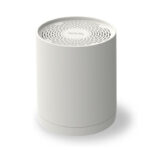5 things you (maybe) don’t know about air quality

Effects on mental health

In addition to the known effects on physical health, air quality can also affect mental health. Some research suggests that prolonged exposure to air pollutants such as particulate matter may be related to an increase in mood disorders, anxiety and depression.
For example, exposure to high levels of smog or air pollutants can trigger a stress response in the body, which can negatively affect mental health in the long term. In fact, air pollutants can affect levels of neurotransmitters in the brain, such as serotonin, which are involved in mood regulation.
Indoor air can be up to 10 times more polluted than outdoor air

In addition to the known effects on physical health, air quality can also affect mental health. Some research suggests that prolonged exposure to air pollutants such as particulate matter may be related to an increase in mood disorders, anxiety and depression.
For example, exposure to high levels of smog or air pollutants can trigger a stress response in the body, which can negatively affect mental health in the long term. In fact, air pollutants can affect levels of neurotransmitters in the brain, such as serotonin, which are involved in mood regulation.
Effects on fertility and complications in pregnancy

Some research has suggested that exposure to certain air pollutants, such as fine particulate matter, may affect fertility in both men and women. This is still an evolving field of study, but it raises important concerns about reproductive health.
In addition, some research has suggested a correlation between air pollution and an increased risk of miscarriage and complications during pregnancy, such as pre-eclampsia and low birth weight. This may be due to the negative effects of pollution on hormone balance and reproductive health.
Impact on sleep

Air pollution can affect sleep quality. As mentioned earlier, the air inside buildings can be more polluted than the air outside, and these pollutants can cause respiratory irritation, congestion and other physical problems that can disturb sleep, leading to frequent awakenings or difficulty falling asleep.
Scientific studies have shown that in some cases, air pollution can be associated with an increased risk of cardiovascular diseases such as hypertension, a condition that can negatively affect sleep quality by increasing the risk of sleep apnoea and other discomforts. Air pollution can therefore contribute to a number of sleep disorders, which in turn can have negative consequences on people’s overall health and well-being.
Effects on habitats and animals

Air pollutants can also affect vegetation. For example, tropospheric ozone can damage plant leaves, reducing the capacity for photosynthesis and compromising agricultural production.
Air pollution can have various effects on animals, both wild and domestic, due to their sensitivity to chemicals in the air and the physical effects of pollution. Animals are constantly in contact with the pavement, which is why the risk of inhaling fine dust in the long term is very high. These harmful particles can irritate the respiratory tract of animals causing coughing, sneezing, breathing difficulties and other problems similar to those observed in humans.
These are just a few examples of how air quality can affect various aspects of our lives and surroundings. Continuing to understand these impacts can guide us towards better policies and actions to protect our health and environment.







